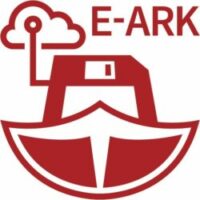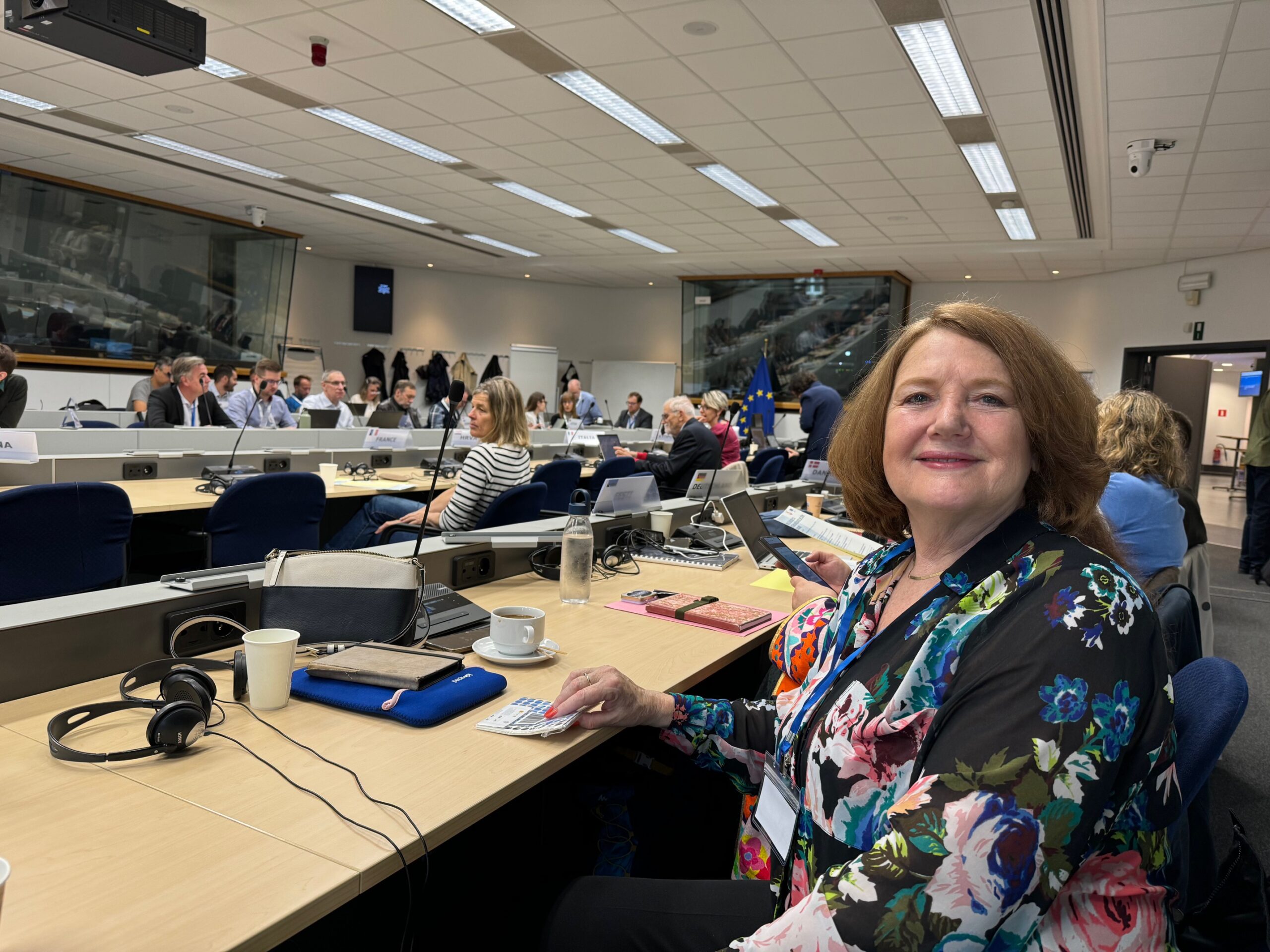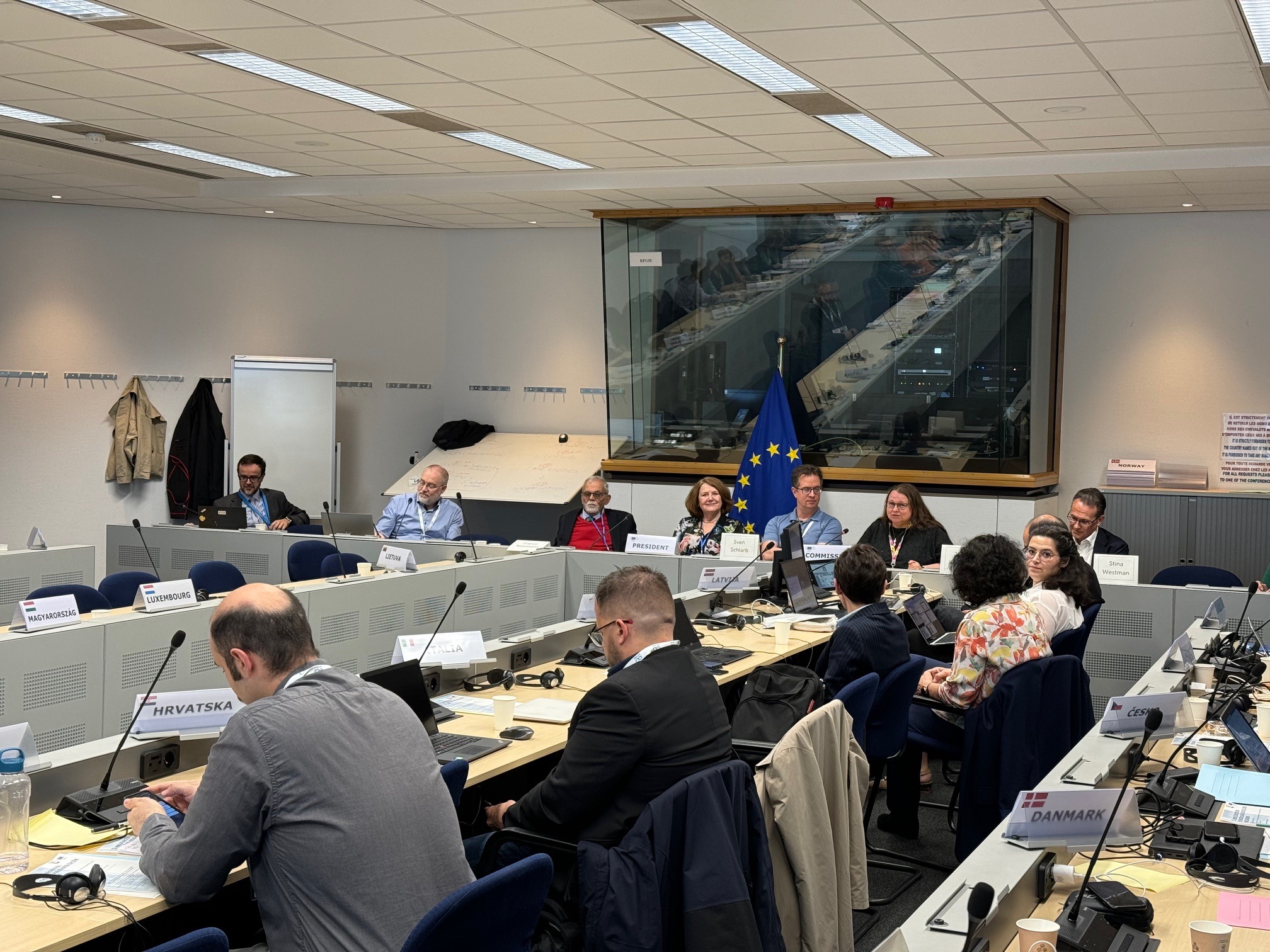
Over the last 10 years, the partners of the E-ARK Project have worked together to develop and test specifications and tools for the creation and management of information packages for preservation.
The E-ARK Foundation is a consortium of partners working with the European Commission as part of the eArchiving Initiative to provide core specifications, software, training and knowledge. The consortium’s aim is to promote the interoperability of digital archives in Europe and to help organisations and people to preserve information for the long term.
We recently gathered at the Albert Borschette Building in Brussels to celebrate the tenth anniversary of the first E-ARK project funded by the European Commission. The agenda presented a variety of speakers who looked at how far we have come and also the next challenges for our digital preservation activities.
The E-ARK team and many of the OPF staff, worked hard to put this hybrid event together, with the intention of showcasing the evolution of the Initiative and feature contributions from the key people involved. I was there on behalf of the Open Preservation Foundation and, even as a member of the project team, I was impressed by the scope and quality of the work shared during the event. As promised, the main topics of discussion were:
- eArchiving reflections, achievements, milestones and challenges.
- eArchiving experiences, including presentations and discussions with solution providers and stakeholders.
- Strategies for archival policies and the implementation of E-ARK specifications and eArchiving components in national archives
- eArchiving challenges and concerns for the future.
In this blog post, I hope to share some of the highlights from presentations given at the conference. The tools, resources and solutions they mention will be of interest to many OPF members and the wider community.
The event was opened by Rehana Schwinninger-Ladak, (Directorate-General for Communications Networks, Content and Technology (CNECT)) of the European Commission), Fulgencio Sanmartín (Policy officer, DG CNECT, European Commission), Master of Ceremonies Ross King (Austrian Institute of Technology (AIT) and E-ARK Consortium Group Lead) and Janet Anderson (Highbury R&D, Ireland, and coordinator of the E-ARK Consortium).
Janet gave an introductory recap of reflections, achievements, milestones and challenges of the project. It was great to start with a presentation that set a positive tone for the event and remind the attendees that ‘the E-ARK project goal is to pilot archival services to keep digital records authentic and usable based on current best practices.’ Janet went on to discuss how ‘these will address the three main endeavours of an archive: acquiring, preserving and enabling re-use of information.’ As coordinator of the E-ARK Consortium, Janet has worked tirelessly to keep us all on track to achieve this goal. Her presentation was followed by a round table discussion where Jan Dalsten from the Danish National Archives told us “It’s important to know that there is a community that we can learn from.” John Sheridan from the UK National Archives stressed the importance of access saying that “Archives need to be used to be useful.”
There were four initial presentations that discussed experiences and use cases by different sectors. Three of these presentations were by OPF members, and it was a joy to see the hard work and efforts undertaken by organisations we know well.
Karin Bredenberg, a Metadata Strategist at Kommunalförbundet Sydarkivera in Sweden presented E-ARK specifications in the core of the 10 years achievements. While working with these specifications for longer than 10 years themselves, Karin covered the journey from starting out with the Swedish project eARD to finishing with a call to contribute to the specifications we have now.
Koit Saarevet who spoke about their experiences of Using SIARD specifications in the National Archives from Estonia, was followed by Milan Valadoum, a Metadata Engineer at meemoo in Belgium who presented The role of E-ARK specification in the ingest process. The final presentation of the morning was from Corinne Frappart from the EU Publication Office who talked about the Experience of EUPO using E-ARK specification together with FRBR standard.
A few common themes started to emerge; institutions take a long time to change, the increasing complexity of ingested materials, up-skilling takes time, more IP and data protection rules and the need for non-technical, user-friendly manuals.


The next section was presented by solution providers, and covered how they implement E-ARK Specifications. In particular there was a presentation by Luis Faria, the Research and Innovation Director from Keep Solutions in Portugal (Innovation Through Collaborations: RODA, eArchiving and the Next Decade of Digital Preservation), which covered what they hope to see from eArchiving until 2034. There was an interesting discussion around the increase in regulations for data producing software; guidelines for the requirements for software and the formats produced by the software would hopefully ensure stronger archivability and long-term preservation. This was a talking point I took back to my own team in one of our morning drop-ins between the OPF staff, which was a fun way to start the morning.
A roundtable followed, on Strategies for archival policies which discussed E-ARK specifications in the National Archives. The first round was a short discussion following a presentation of experiences with implementing E-ARK products (specifications, software tools, reference architecture) in a national environment. This was continued with a second discussion acknowledging that eArchiving initiatives serve a wider audience beyond national archives – so how can future developments ensure accessibility and usability for all archiving service providers? Again, the notions that ‘uptake takes time’ and ‘complexity is increasing’ were vocalised.
‘Challenges and Concerns’ was the title of the final section, which ended in another round table ‘Where do you think the eArchiving Initiative should focus?’ which I moderated. At the beginning of the day, we gave post-it notes to the physical audience and invited the virtual audience to post in the online chat. We wanted to know where the audience felt we should focus our efforts in the future. We grouped the responses into 5 main categories; Community, Adoption/Maturity Journey/Sustainability, Competences & Skills, Standards/3D Standards, Tools/Dissemination.
“It’s not for nothing that the E-ARK logo is an ocean-going vessel” I told everyone. Adopting any major process for an organisation is like turning an ocean liner as heard earlier. It takes time and a lot of effort. I started with the crew of the ship – it’s a close knit community. Which led me easily to the first category. Then we need to leave port and start our journey, using stabilisers to make sure that we stay on an even keel. For that we need skills and knowledge. And of course, we need to follow a lot of rules for the safety and comfort of everyone aboard. So we need standards and specifications. Just like a ship uses things like engines and bow thrusters, we need tools. And finally, when we reach our destination, we need to share our experiences and disseminate what we’ve learnt.
The round table consisted of Sven Schlarb (AIT and E-ARK Consortium Technical Director), Karin Bredenberg, Jaime Kaminski (Highbury R&D, Ireland, and E-ARK Consortium Training Activity Lead), Franco Niccolucci (Prisma Italy and 3D eArchiving group co-lead) and Stina Westman (South Eastern Finland Technical University of Applied Sciences (XAMK). Each member of the round table summarised the comments and suggestions of their category. I will be putting them all in a report to be sent to the Policy Officer and shared with the consortium.
It was great to meet so many of you in person for the first time. I would like to take a moment to thank the organisers of the conference, and to all the contributors who presented – your hard work does not go unnoticed. The OPF are grateful to be a part of this Consortium, working towards a seamless and free-flowing data environment without restrictions.
The eArchiving team found this event so useful that it is planning to make this an annual event in Brussels. I am certainly looking forward to the next one!
All slides from the presentations at the conference are available on the E-ARK Website and videos will be available in due course. More information on all the E-ARK resources mentioned above can be found on the project website: http://www.eark-project.eu.
To see the program and speaker details of the event, see here.
To see the event advertisement, see here.


